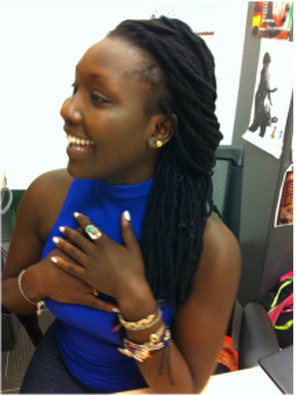 Scovia Wilson
Scovia Wilson Don’t call her Nancy.
She may have lost her birth certificate in her home country, but her real name is Scovia Wilson and as of Oct. 17, she is a citizen of the United States of America.
The 19-year-old, University of Memphis sophomore nursing major, who hails from a war zone in Sudan, said Nancy is a nickname she inherited from a mission’s woman.
The woman came from an organization called Catholic Charities, which has helped refugees escape war zones, religious and political persecution and resettle in the U.S. for approximately 73 years.
“The mission lady called me Nancy as a nick name and it kind of got stuck. In the process of coming to America, they accidentally put Nancy instead of Scovia on my paperwork,” she said. “I couldn’t change it back to Scovia until my citizenship, which took eight years. Finally, I have my name back.”
Scovia was named by her grandmother.
“Scovia means fruits of the spirit and my middle name, Dawa, is Swahili for medicine,” she said.
Before moving to Memphis, Scovia, her grandmother, grandfather and two brothers lived in Kenya, then Narobi, Uganda and Kampala waiting to become U.S. citizens.
“We were supposed to come on Sept. 11, but everything stopped because of it,” she said. “I didn’t understand why we couldn’t come because two buildings fell down. But when I learned about it later, I understood.”
Three years later, she and her family landed in New York. Scovia was almost 10 years old.
When you come to America, you’re allowed two bags per family.
“They’re filled with some of our stuff, but not a lot of our stuff,” she said. “You don’t put clothes, you put items that represent who you are. My grandmother brought knitting stuff. You wear what you have. The least of your worries is clothes.”
The journey to the US was a long one.
“We took five planes to come to America. On the first plane, we went back to the airport of Uganda and then flew to London, Canada, New York and then Memphis,” she said.
Scovia said she imagined life in America as a constant vacation with big hats and sipping big drinks with coconut in them.
“(Before coming to America) we watched Power Rangers and saw images of New York and California so I thought that was where we were going to live,” she said. “A place with big buildings and no trees. I thought Power Rangers and the Ghost Busters were always going to save me, and I thought I was always going to wear roller blades, skating around.”
When Scovia and her family landed in New York, the first thing they saw was the Statue of Liberty.
When they got to their hotel, she thought they were going to live in the room with the big bed and big flat screen TV.
“You called someone on the phone to say, ‘I want pizza,’ and they bring it to you. And I loved it,” she said. “Until that point, I watched TV about America, so I put it on a channel to see what they were doing in Africa.”
She was shocked.
“I saw what they saw of us. Poverty,” she said. “They depicted my home as African booty scratchers, naked people and that’s not what I knew. We have everything America has but I didn’t know that.”
The process of citizenship started in the summer of 2013. Scovia missed two months of school getting her citizenship.
She said citizenship papers cost $900 and are sent to the government. Mistakes such as misspelled names and wrong addresses can delay the applications process. If all the paper work is correct, after a month you get finger printed.
From there, Scovia got her picture taken, and a CD and booklet about America and American History for the citizenship test.
“I winged it (the test),” she said. “It’s like an interview and you go back to the place with fingerprinting, which is the Immigration Office on Summer Avenue.”
Some of the people that work in immigration do not want you to become a citizen, but she had a nice person testing her, she said.
“Lord knows I didn’t know anything,” she said. “He only asked me like, 10 questions. My whole interview was more so just talking to him. What does this mean to you? Why do you want to be a citizen?”
Part 2 of this story will be published later this week.
 RSS Feed
RSS Feed